Module 7 Unit 1 My dad goes to work at eight o'clock every morning 课件(共36张PPT)
文档属性
| 名称 | Module 7 Unit 1 My dad goes to work at eight o'clock every morning 课件(共36张PPT) |
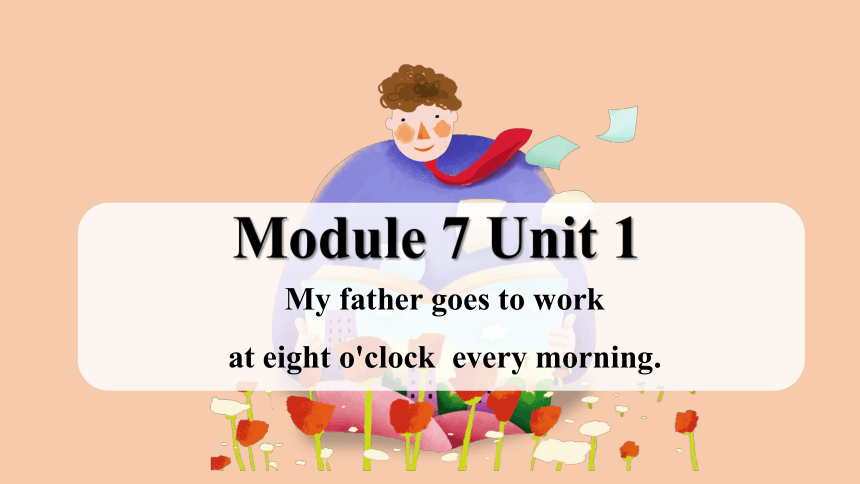
|
|
| 格式 | pptx | ||
| 文件大小 | 20.8MB | ||
| 资源类型 | 试卷 | ||
| 版本资源 | 外研版(三年级起点) | ||
| 科目 | 英语 | ||
| 更新时间 | 2024-04-26 13:08:31 | ||
图片预览

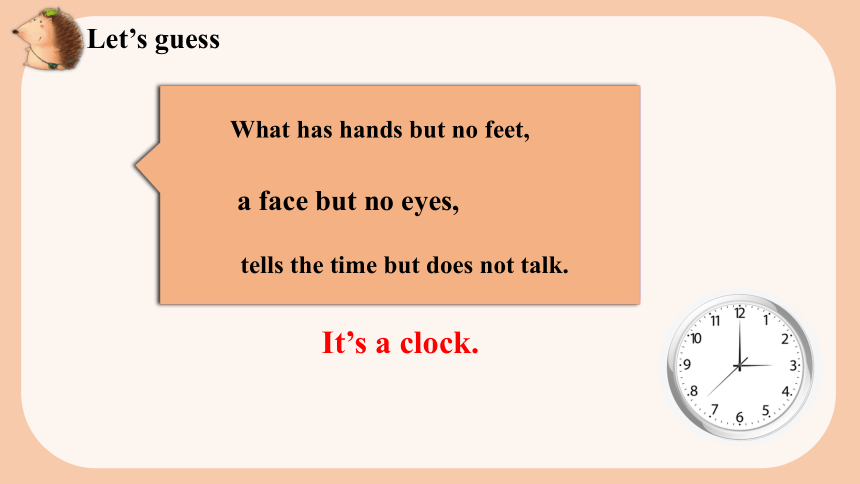
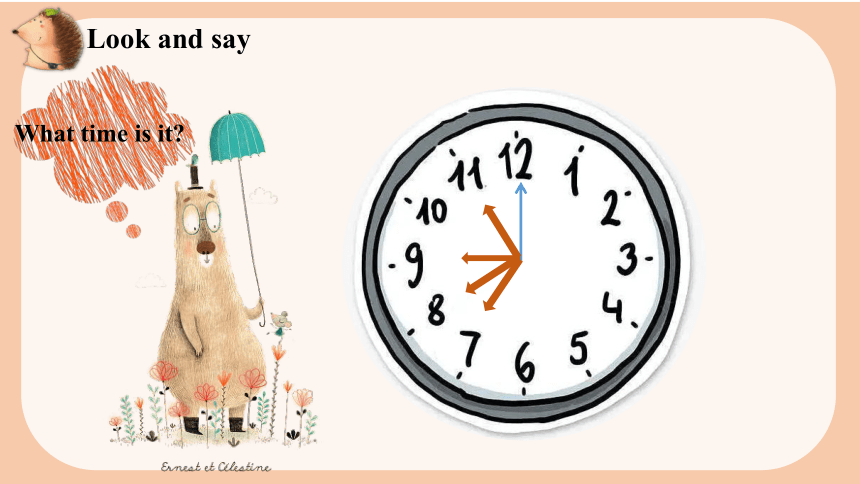
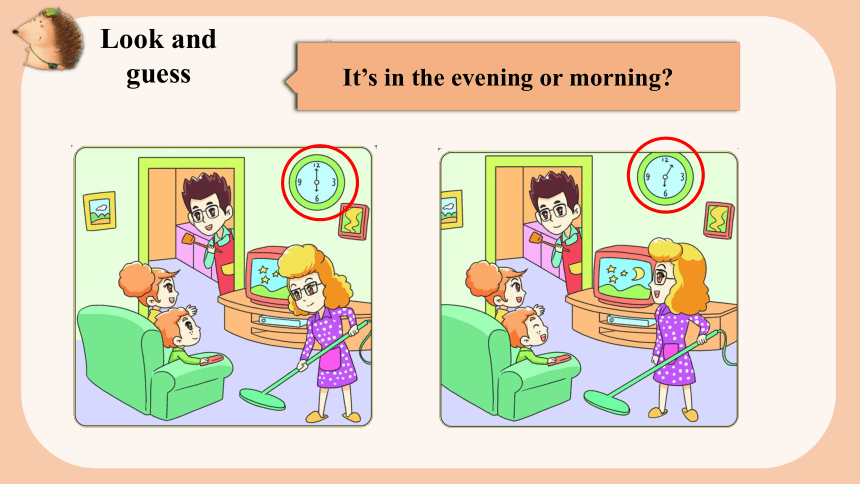
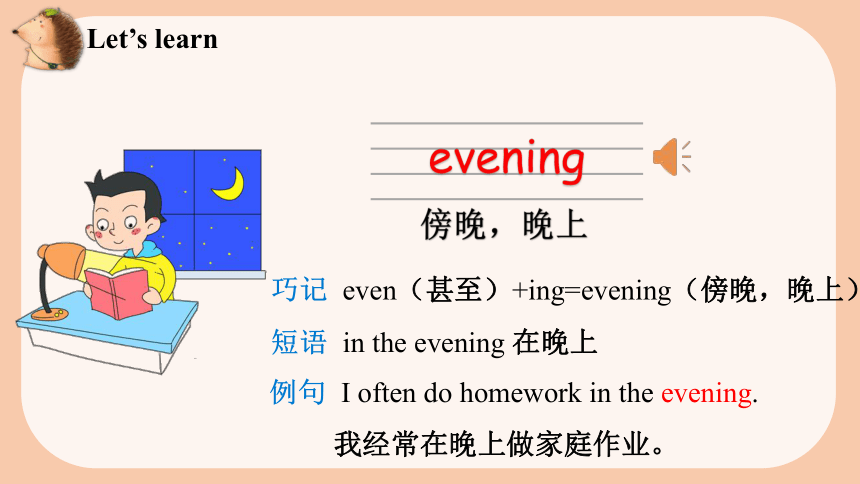
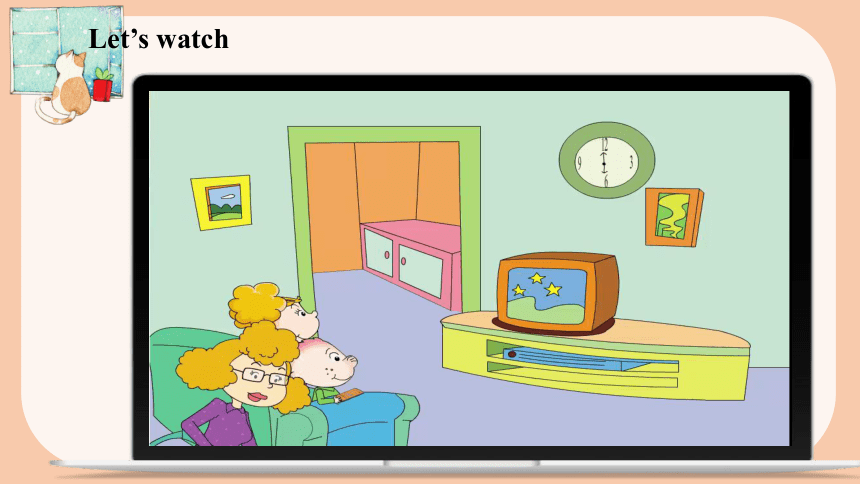
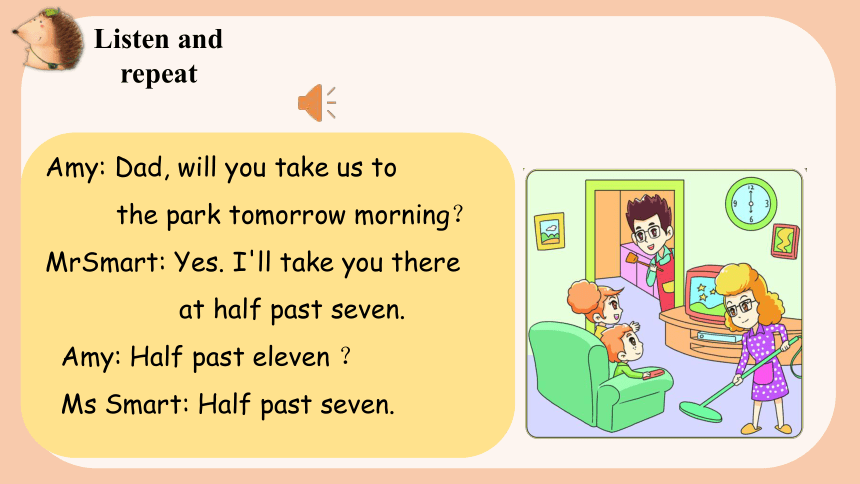
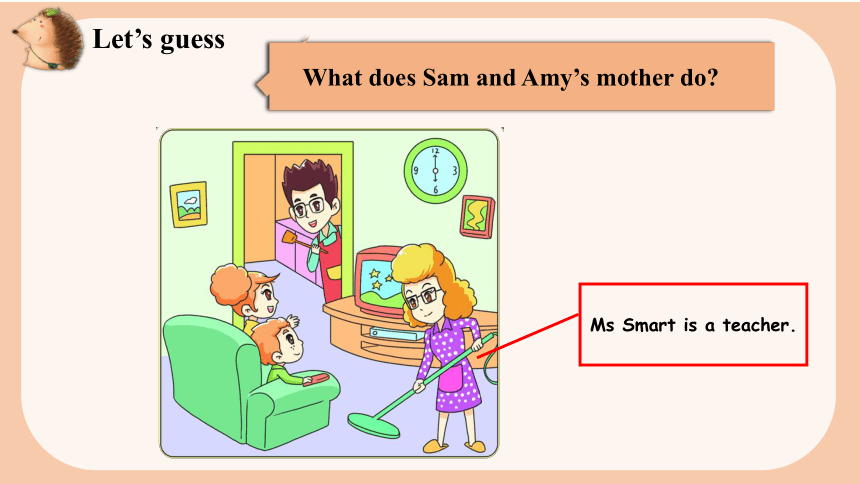
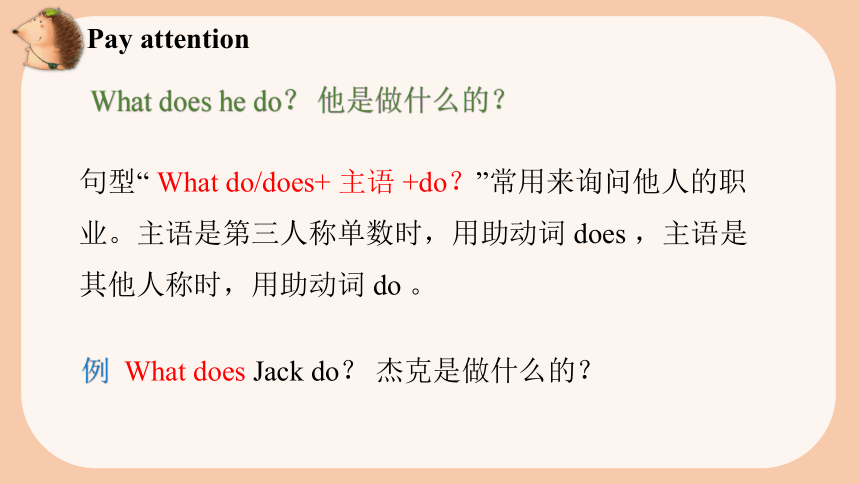
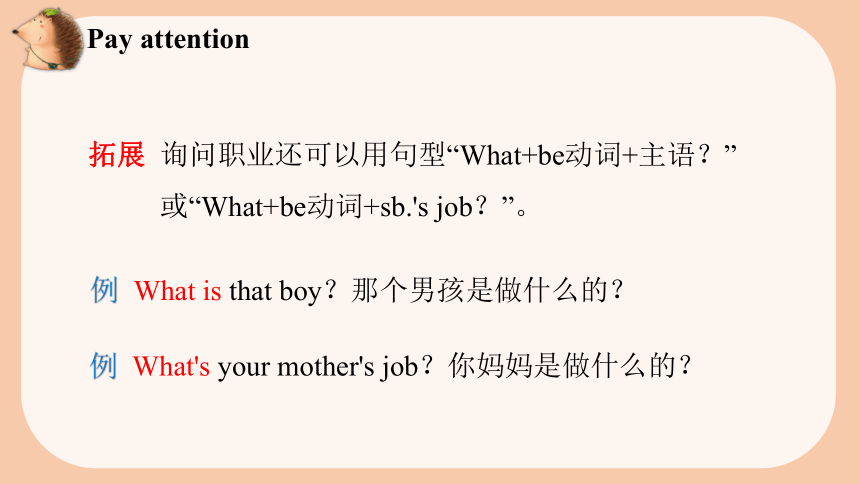
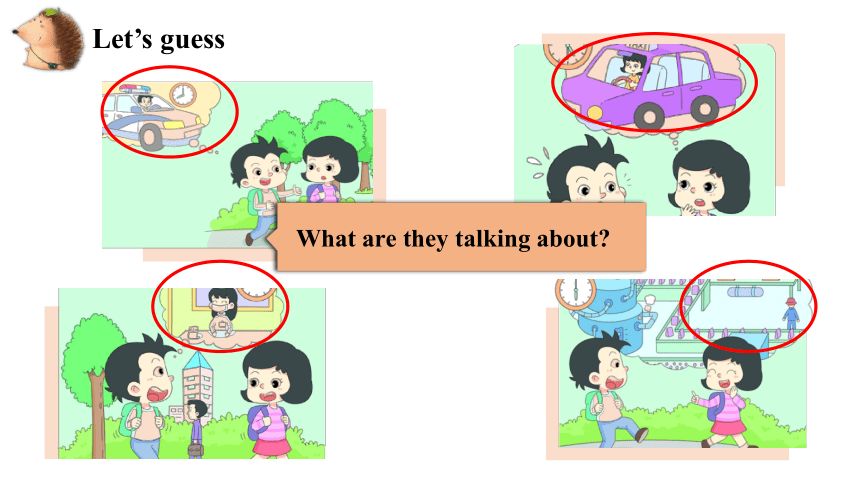

文档简介
(共36张PPT)
Module 7 Unit 1
My father goes to work
at eight o'clock every morning.
What has hands but no feet,
Let’s guess
a face but no eyes,
tells the time but does not talk.
It’s a clock.
Look and say
What time is it
Look and guess
It’s in the evening or morning
evening
傍晚,晚上
巧记 even(甚至)+ing=evening(傍晚,晚上)
短语 in the evening 在晚上
例句 I often do homework in the evening.
我经常在晚上做家庭作业。
Let’s learn
Let’s watch
Amy: Dad, will you take us to
the park tomorrow morning?
MrSmart: Yes. I'll take you there
at half past seven.
Listen and repeat
Amy: Half past eleven ?
Ms Smart: Half past seven.
Let’s guess
What does Sam and Amy’s mother do
Ms Smart is a teacher.
What does he do? 他是做什么的?
句型“ What do/does+ 主语 +do?”常用来询问他人的职业。主语是第三人称单数时,用助动词 does ,主语是其他人称时,用助动词 do 。
例 What does Jack do? 杰克是做什么的?
Pay attention
拓展 询问职业还可以用句型“What+be动词+主语?”
或“What+be动词+sb.'s job?”。
例 What is that boy?那个男孩是做什么的?
例 What's your mother's job?你妈妈是做什么的?
Pay attention
Let’s guess
What are they talking about
Let’s watch
A
B
C
D
What does Fangfang’s father do
What does Daming’s father
do
What does Daming’s mother do
What does Fangfang’s mother do
Watch and answer
Let’s watch
Daming: My father goes to work
at eight o'clock every morning.
Fangfang:What does he do?
Daming: He's a policeman.
Let’s learn
My father goes to work at eight o'clock every morning.
我爸爸每天早上八点去上班。
“主语 +go/goesto work+at+ 具体时间( + 其他)”用来描述“某人何时去上班”。时态为一般现在时。当主语是第三人称单数时,谓语动词要用 goes 。
Pay attention
常与一般现在时连用的时间状语有: often (经常), always(一直), never (从不), usually (通常), seldom (几乎不), sometimes (有时), everyday (每天)等。
例 My sister goes to work at six o'clock every morning.
我姐姐每天早上六点去上班。
Pay attention
拓展 动词第三人称单数的构成:
动词情况 词尾变化 例词
一般动词 直接加-s play→plays 玩
draw→draws 画
以-s,-x,-ch,-sh 结尾的动词 加-es pass→passes 传递
wash→washes 洗
以“辅音字母+ y”结尾的动词 变 y为 i,再 加-es carry→carries 搬运
study→studies 学习
Pay attention
He's a policeman. 他是一名警察。
句型“主语 +be 动词( am/is/are ) +a/an+ 职业名称”用
来介绍某人的职业。 be 动词要随主语人称和数的变化而变化。
例 I am a doctor. 我是一位医生。
3
Pay attention
Fangfang: My father goes to work at
six o'clock every evening.
Daming: That's late. What does he do?
Fangfang: He's a worker in a factory.
Let’s learn
late
近日暮的;近深夜的;时间不早的
形近 date(名词)日期
对应 early(形容词)早的
例句 It's late. Hurry up!
时间不早了。快点!
Let’s learn
worker
工人
巧记 work(工作)+er=worker(工人)
例句 Mr Zhang is a worker.
张先生是一名工人。
Let’s learn
factory
制造厂;工厂
巧记 fact(事实)+ory=factory(制造厂;工厂)
短语 factory workers 工厂工人
例句 Uncle Wang works in a factory.
王叔叔在一家工厂工作。
Let’s learn
Daming: My mother goes to work at
eleven o'clock every night.
Fangfang:That's very, very late.
What does she do?
Daming: She's a nurse.
Let’s learn
Fangfang: My mother goes to work
at half past five every morning.
Daming: That's very early.
What does she do ?
Fangfang: She's a taxi driver.
Let’s learn
early
早的
巧记 ear(耳朵)+ly=early(早的)
对应 easy(形容词)容易的
例句 I am late. 我早到了。
Let’s learn
taxi
出租车,计程车
近义 cab(名词)出租车
短语 a taxi driver 出租车司机
call a taxi 叫出租车
例句 You can call a taxi on the street.
你可以在街上叫辆出租车。
Let’s learn
Let’s learn
Fangfang: Look!Here's my mother !
Fangfang's mother: Hello, children. I'll take you to school.
Fangfang and Daming: Thank you !
Watch and imitate
My father goes to work at eight o'clock every morning. He's a policeman.
Let’s retell
M y father goes to work at six o'clock every evening. He's a worker in a factory.
Let’s retell
teacher
doctor
nurse
My uncle
My father
My mother
Group work
单项选择。
1. My father _____ to work every day.
A. go B. goes C. went
2. Hurry up! It's too _____. It's time to go home.
A. tired B. late C. early
Practice
连词成句。
1. worker, factory, he, is, a, a, in (.)
_____________________________________________
2. do, she, what, does ( )
_____________________________________________
He is a worker in a factory.
What does she do
Practice
Please read the new words and the new text at least three times.
Must do
Try to describe your parents’ work and their work time with the key sentences we learnt today.
Can do
Thank you
Module 7 Unit 1
My father goes to work
at eight o'clock every morning.
What has hands but no feet,
Let’s guess
a face but no eyes,
tells the time but does not talk.
It’s a clock.
Look and say
What time is it
Look and guess
It’s in the evening or morning
evening
傍晚,晚上
巧记 even(甚至)+ing=evening(傍晚,晚上)
短语 in the evening 在晚上
例句 I often do homework in the evening.
我经常在晚上做家庭作业。
Let’s learn
Let’s watch
Amy: Dad, will you take us to
the park tomorrow morning?
MrSmart: Yes. I'll take you there
at half past seven.
Listen and repeat
Amy: Half past eleven ?
Ms Smart: Half past seven.
Let’s guess
What does Sam and Amy’s mother do
Ms Smart is a teacher.
What does he do? 他是做什么的?
句型“ What do/does+ 主语 +do?”常用来询问他人的职业。主语是第三人称单数时,用助动词 does ,主语是其他人称时,用助动词 do 。
例 What does Jack do? 杰克是做什么的?
Pay attention
拓展 询问职业还可以用句型“What+be动词+主语?”
或“What+be动词+sb.'s job?”。
例 What is that boy?那个男孩是做什么的?
例 What's your mother's job?你妈妈是做什么的?
Pay attention
Let’s guess
What are they talking about
Let’s watch
A
B
C
D
What does Fangfang’s father do
What does Daming’s father
do
What does Daming’s mother do
What does Fangfang’s mother do
Watch and answer
Let’s watch
Daming: My father goes to work
at eight o'clock every morning.
Fangfang:What does he do?
Daming: He's a policeman.
Let’s learn
My father goes to work at eight o'clock every morning.
我爸爸每天早上八点去上班。
“主语 +go/goesto work+at+ 具体时间( + 其他)”用来描述“某人何时去上班”。时态为一般现在时。当主语是第三人称单数时,谓语动词要用 goes 。
Pay attention
常与一般现在时连用的时间状语有: often (经常), always(一直), never (从不), usually (通常), seldom (几乎不), sometimes (有时), everyday (每天)等。
例 My sister goes to work at six o'clock every morning.
我姐姐每天早上六点去上班。
Pay attention
拓展 动词第三人称单数的构成:
动词情况 词尾变化 例词
一般动词 直接加-s play→plays 玩
draw→draws 画
以-s,-x,-ch,-sh 结尾的动词 加-es pass→passes 传递
wash→washes 洗
以“辅音字母+ y”结尾的动词 变 y为 i,再 加-es carry→carries 搬运
study→studies 学习
Pay attention
He's a policeman. 他是一名警察。
句型“主语 +be 动词( am/is/are ) +a/an+ 职业名称”用
来介绍某人的职业。 be 动词要随主语人称和数的变化而变化。
例 I am a doctor. 我是一位医生。
3
Pay attention
Fangfang: My father goes to work at
six o'clock every evening.
Daming: That's late. What does he do?
Fangfang: He's a worker in a factory.
Let’s learn
late
近日暮的;近深夜的;时间不早的
形近 date(名词)日期
对应 early(形容词)早的
例句 It's late. Hurry up!
时间不早了。快点!
Let’s learn
worker
工人
巧记 work(工作)+er=worker(工人)
例句 Mr Zhang is a worker.
张先生是一名工人。
Let’s learn
factory
制造厂;工厂
巧记 fact(事实)+ory=factory(制造厂;工厂)
短语 factory workers 工厂工人
例句 Uncle Wang works in a factory.
王叔叔在一家工厂工作。
Let’s learn
Daming: My mother goes to work at
eleven o'clock every night.
Fangfang:That's very, very late.
What does she do?
Daming: She's a nurse.
Let’s learn
Fangfang: My mother goes to work
at half past five every morning.
Daming: That's very early.
What does she do ?
Fangfang: She's a taxi driver.
Let’s learn
early
早的
巧记 ear(耳朵)+ly=early(早的)
对应 easy(形容词)容易的
例句 I am late. 我早到了。
Let’s learn
taxi
出租车,计程车
近义 cab(名词)出租车
短语 a taxi driver 出租车司机
call a taxi 叫出租车
例句 You can call a taxi on the street.
你可以在街上叫辆出租车。
Let’s learn
Let’s learn
Fangfang: Look!Here's my mother !
Fangfang's mother: Hello, children. I'll take you to school.
Fangfang and Daming: Thank you !
Watch and imitate
My father goes to work at eight o'clock every morning. He's a policeman.
Let’s retell
M y father goes to work at six o'clock every evening. He's a worker in a factory.
Let’s retell
teacher
doctor
nurse
My uncle
My father
My mother
Group work
单项选择。
1. My father _____ to work every day.
A. go B. goes C. went
2. Hurry up! It's too _____. It's time to go home.
A. tired B. late C. early
Practice
连词成句。
1. worker, factory, he, is, a, a, in (.)
_____________________________________________
2. do, she, what, does ( )
_____________________________________________
He is a worker in a factory.
What does she do
Practice
Please read the new words and the new text at least three times.
Must do
Try to describe your parents’ work and their work time with the key sentences we learnt today.
Can do
Thank you
同课章节目录
- Module 1
- Unit 1 We lived in a small house.
- Unit 2 She didn't have a television.
- Module 2
- Unit 1 She learnt English.
- Unit 2 Mr Li was a teacher.
- Module 3
- Unit 1 She had eggs and sausages.
- Unit 2 Sam ate four hamburgers.
- Module 4
- Unit 1 Let's make a home library.
- Unit 2 We can find information from books and CDs.
- Module 5
- Unit 1 It's big and light.
- Unit 2 It's too big for you.
- Module 6
- Unit 1 I went there last year.
- Unit 2 She visited the Tianchi Lake.
- Module 7
- Unit 1 My father goes to work at eight o'clock eve
- Unit 2 I'll be home at seven o'clock.
- Module 8
- Unit 1 Will you help me?
- Unit 2 I made a kite.
- Module 9
- Unit 1 We laughed a lot.
- Unit 2 Mum bought new T-shirts for you.
- Module 10
- Unit 1 Where are you going to go?
- Unit 2 I'm in New York now.
- Review Module
- Unit 1
- Unit 2
